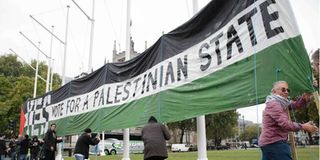Palestine to continue serving on ICC executive office

Pro-Palestinian supporters position a giant banner calling for a recognised Palestinian State, in Parliament Square, central London on October 13, 2014.
What you need to know:
- Palestine, a UN Observer State, has bickered with Israel over territorial boundaries.
- The decision came at the end of the 19th Session of the Assembly of State Parties (ASP) to the Rome Statute.
Palestine will continue serving on the executive office of the International Criminal Court after member states unanimously voted to have it continue until the end of next year.
The decision came at the end of the 19th Session of the Assembly of State Parties (ASP) to the Rome Statute, the formative law that created the ICC, this week in New York and virtually.
Palestine’s Foreign Affairs and Expatriates Minister Riyad Malki told local WAFA News agency the re-election will boost his country’s quest for justice at the Court.
The executive office, mostly ceremonial, acts like a bureau to supervise the work of the ASP and campaigns to promote the universal acceptance of the Rome Statute as well as encouraging non-members to join.
Palestine, which joined the Court in 2015 after formally accepting the jurisdiction of the Court has been sought to have some senior government officials in Israel prosecuted for authorising what Palestine says is illegal occupation of its territories including East Jerusalem and alleged displacement of Palestinian people.
The matter is still pending before the Pre-Trial Chamber as to whether the ICC has jurisdiction on the matter. Israel, whom Palestine accuses of atrocities, is not a member of the ICC though.
With 123 members, the ICC seeks to prosecute individuals involved in war crimes, genocide and crimes against humanity on the principle of complementarity which means that it cannot charge those who already face similar trials in their respective countries.
Member states
The ICC is not an organ of the United Nations but because the definitions of these crimes are based on wider treaties at the UN, it routinely indicts individuals from countries that are not member states.
The Court has faced political pressure, especially from countries like the US, after it decided to investigate alleged war crimes in Afghanistan where American troops were involved in the fight against the Taliban. Washington responded by revoking visas of prosecutor Fatou Bensouda and other ICC officials.
Maliki said the Court should provide justice to the victims and punish the criminals to guarantee the protection of civilians and justice, including in Palestine, “which has witnessed the continuation of the Israeli occupation crimes for decades without accountability.”
He added that ICC must perform its role “without double standards and be indifferent to the threats and pressures that aim to discourage it from carrying out its responsibilities under the Rome Statute.”
Palestine, a UN Observer State, has bickered with Israel over territorial boundaries. Although both sides agree to a two-state solution, they have differed on where each state starts and stops with Palestine accusing Israel of invading its land.





